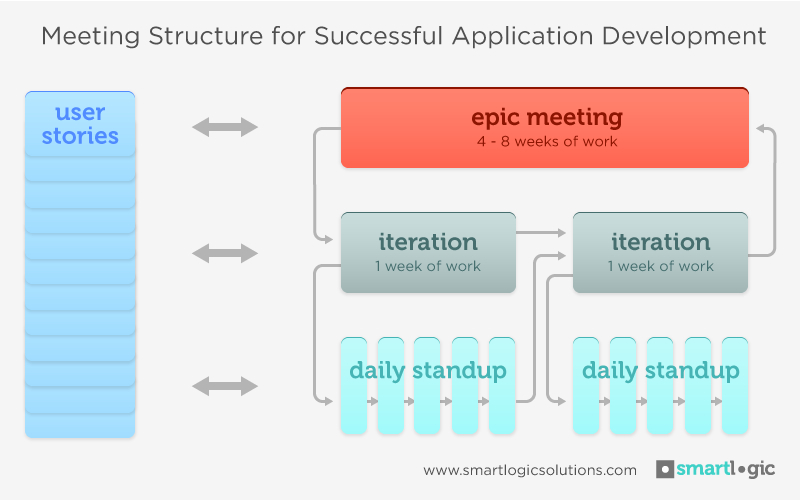Hint: unstructured marathon meetings that wander aimlessly aren’t the answer.
We’ve all had to endure loathsome meetings full of unprepared participants yammering about pointless propositions. It’s a waste of everyone’s time. Hopefully, we’ve all also had the pleasure of an efficient, directed, concise meeting that is objective-driven and gets the job done quickly and effectively. There’s a world of difference.
We constantly focus on making meetings productive and efficient, which, for one, means having only the necessary people involved in each meeting. You need the right people in the same room, but you don’t need to invite everyone. Trust me, their feelings won’t be hurt if you don’t include them on a meeting that doesn’t pertain to them.
Another way to maximize the productivity of your meetings is to utilize your entire arsenal of meeting styles. Below are the meetings we use to keep complex application development projects running smoothly:

Epic Meetings
These meetings, in which heroes are born, sagas unfold, and legends come to life, take place only once every month or two. They’re longer, but not unfocused.
For us, we call these meetings Epic not just because of their length (a few hours) and their goals (to plan for 1-2 months of work), but because during Epic Meetings, we collect several small “user stories” that build the big picture. A user story describes a behavior of the system from the perspective of a user. At SmartLogic, user stories are the fundamental building block of our process. Then, for large projects, stories are often grouped together into "Epics," which describe not only our meetings, but also the behavior of a discrete component of the system.
As the software development company involved, at a minimum our lead developer participates in the meeting. On your end, major project stakeholders should participate in the meeting. If you’ve done homework like designs, wireframes, or information architecture, an Epic meeting is the time to review them. Bring your Nalgene and one of those stadium cushions; you’re going to emerge from the conference room a better-informed person ready to tackle an ambitious to-do list.
Iteration Meetings
Held more frequently, iteration collaboration meetings are usually weekly meetings that stay close to the big picture but iron out weeklong questions that keep the project on track. If you’re starting to think the direction of your project should change and want a sounding board, these meetings are a great place to keep your developers informed.
The same people who attend Epic meetings should show up to these. Your software development company’s lead developer should attend, and your major project stakeholders should also show up.
Daily Standups
Daily standup meetings are usually a 1-10 minute Skype call where your stakeholders and our developers catch up on day-to-day progress. The goal of this micro meeting is to keep clients informed, prevent small problems from becoming big problems, and ensure projects keep pace with expectations, even if expectations shift.
Campfire Chats
Our application developers hang out on Campfire, a real-time chat tool, so that all day, every day, they can quickly chat with each other and our clients. This is a huge help for when you need to talk ‘smore (sorry, couldn’t help it) than you did in a meeting, but don’t need to detain all of the meeting participants to get it done. So you sidebar with just the relevant folks via chat, hammering out any remaining details without wasting anyone’s time.
Communication prevents complications, saving time in the long run. Our goal is to have the fewest number of meetings to get the highest amount of work done—with the simplest process and at the best cost. In today’s quickly evolving marketplace, our meeting process ensures our client’s team and our team keep heading in the same direction, even if the destination is a moving target.
Check out our other tips on optimizing your team:
7 Reasons Why You Should Take A Project Temperature in Application Development
Application Development Process Tip: Reverse Ticket Priorities on Friday
Tools of the StartUp Trade: Application Development Lifesavers
Guide to Application Development Infrastructure: Pairing and CI Servers
9 Application Development Productivity Hacks


